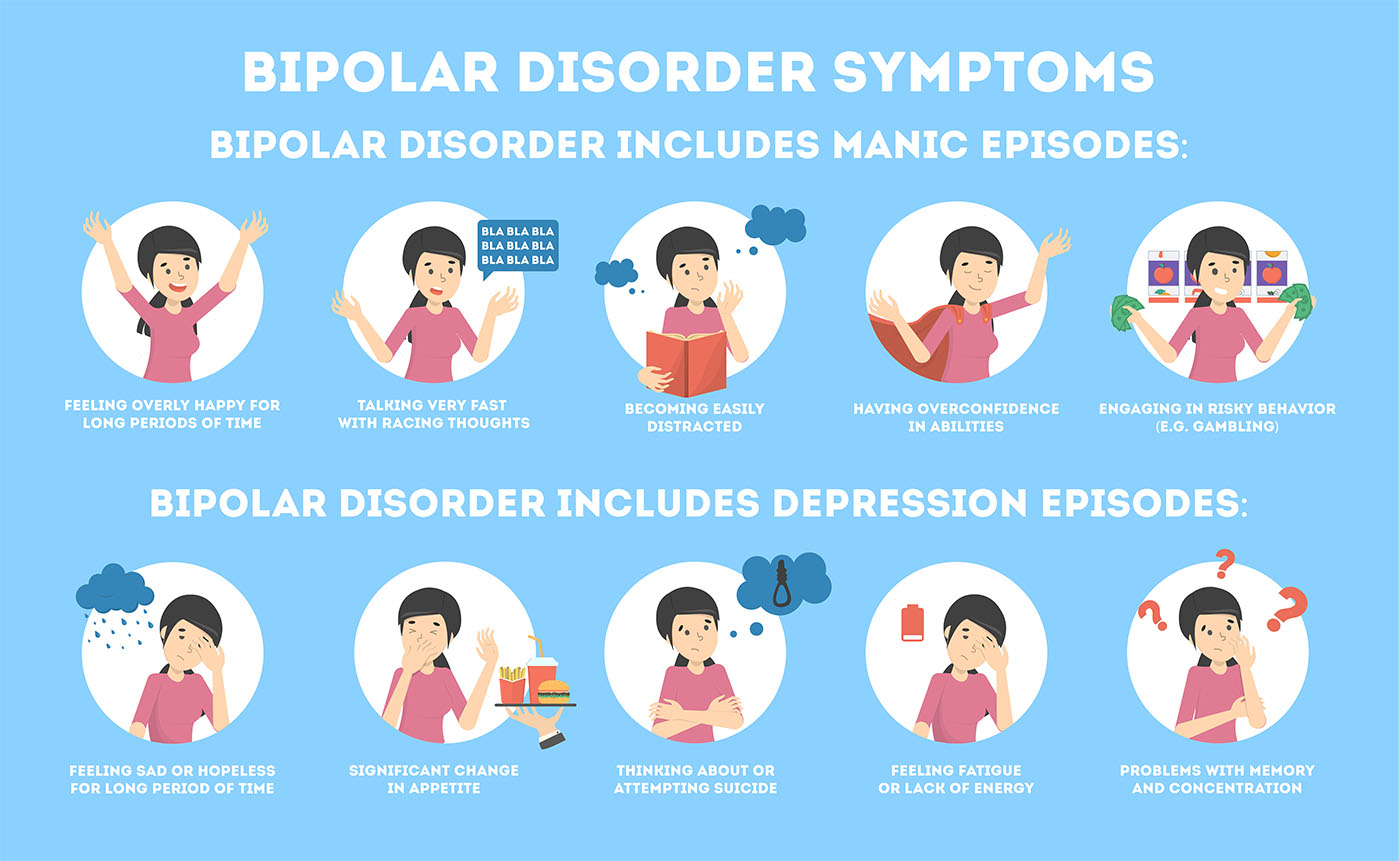
Homeopathic Treatment and Management of
Bipolar Disorder
Bipolar disorder/bipolar affective disorder/manic depressive disorder: Bipolar disorder is a brain disorder that causes unusual shifts in mood, energy, activity levels, and the ability to carry out day-to-day tasks. This is a serious mental illness that is characterized by extreme changes in mood, from mania to depression. It can lead to risky behavior, damaged relationships and careers, and even suicidal tendencies. Suicide is a very real risk for people with bipolar disorder, whether they're in a manic or depressive episode -10%-15% of people with bipolar disorder kill themselves. But bipolar disorder can be treated, and people with this illness can lead full and productive lives.
Symptoms of bipolar disorder: Bipolar disorder is not easy to spot when it starts. The symptoms may seem like separate problems, not recognized as parts of a larger problem. Some people suffer for years before they are properly diagnosed and treated. Like diabetes or heart disease, bipolar disorder is a long-term illness that must be carefully managed throughout a person's life. Bipolar disorder often develops in a person's late teens or early adult years. At least half of all cases start before age 25. Some people have their first symptoms during childhood, while others may develop symptoms late in life. It can affect children as young as 6.
Symptoms of bipolar disorder are severe. They are different from the normal ups and downs that everyone goes through from time to time. People with bipolar disorder experience unusually intense emotional states that occur in distinct periods called "mood episodes." An overly joyful or overexcited state is called a manic episode, and an extremely sad or hopeless state is called a depressive episode. Sometimes, a mood episode includes symptoms of both mania and depression. This is called a mixed state. People with bipolar disorder also may be explosive and irritable during a mood episode. Extreme changes in energy, activity, sleep, and behavior go along with these changes in mood. It is possible for someone with bipolar disorder to experience a long-lasting period of unstable moods rather than discrete episodes of depression or mania. Symptoms of bipolar disorder are described below.
Manic Symptoms: "Manic" describes an increasingly restless, energetic, talkative, reckless, powerful, euphoric period. Lavish spending sprees or impulsive risky sex can occur. Then, at some point, this high-flying mood can spiral into something darker, irritation, confusion, anger, and feeling trapped. Symptoms of mania or a manic episode include:
Mood Changes
Behavioral Changes
Depressive symptoms: "Depression" describes the opposite mood - sadness, crying, sense of worthlessness, loss of energy, loss of pleasure, sleep problems. Symptoms of depression or a depressive episode include:
Mood Changes
Behavioral Changes
1) Bipolar mania or hypo-mania
2) Bipolar depression/major depression
Clinical experience suggests that mania may be more devastating to the family in a very short time; excessive spending can pile up huge debts, reckless driving and/or substance abuse can create legal problems, and impulsive hyper sexuality/extra-marital affairs may break down a marriage or relationship. The earliest signs of emerging mania can be progressive loss of sleep and extra energy. It can be a matter of hours in which such cases become manic psychosis. Very early intervention in such cases can be rewarding and prevent a hospital admission.
Because of the stigma still attached to bipolar disorder (and to many other mental diseases), patients are frequently reluctant to acknowledge that anything is wrong, and doctors often fail to recognize the disorder. In addition, the symptoms may sometimes seem to be merely exaggerated versions of normal moods. In any event, research suggests that almost 75% of cases go untreated or are treated inappropriately.
Diagnosis : Diagnosis is based on the self-reported experiences of an individual as well as abnormalities in behavior reported by family members, friends or co-workers, followed by secondary signs observed by a psychiatrist. Although there are no biological tests which confirm bipolar disorder, tests may be carried out to exclude medical illnesses such as hypo or hyperthyroidism, metabolic disturbance, a systemic infection or chronic disease, and syphilis or HIV infection. An EEG may be used to exclude epilepsy, and a CT scan of the head to exclude brain lesions. Investigations are not generally repeated for relapse unless there is a specific medical indication.
Along with medication, ongoing psychotherapy, or "talk" therapy, is an important part of treatment for bipolar disorder. During therapy, you can discuss feelings, thoughts, and behaviors that cause you problems. Talk therapy can help you understand and ultimately master any problems that hurt your ability to function well in life. It also helps you stay on your medication -- and helps you deal with effects of bipolar disorder on your social and work life. It can help you maintain a positive self-image.
Types of psychotherapy used to treat bipolar disorder include:
Treatment of Bipolar Disorder:
Homeopathic Treatment of Bipolar Disorder: Bipolar disorder can be completely cured if treated comprehensively. Homeopathic medicines help to reinforce the body to reestablish the altered state of mind and its chemical if there is no permanent or irreversible change.
Treatment of Bipolar Disorder by psychotherapy and hypnotherapy:
Psychotherapy and hypnotherapy help a patient of bipolar disorder to completely recover if treated properly.